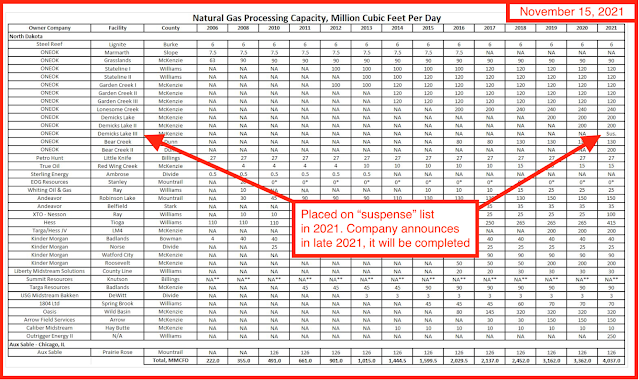Coal: the new transitional fuel; net-zero goals extended to 2070 -- John Kerry, China, India, COP26.
Wind: UK wind generation is today the lowest in two months, providing less than 1GW. This requires the UK to rely on fossil fuels for more than 60% of its power this morning, resulting in pretty high prices. To say the least. "... pretty high prices." LOL.
Ten-year Treasury: 1.573%
VIX: 16. At the lower end of the continuum in the past year. VIX values greater than 30 are generally linked to large volatility
resulting from increased uncertainty, risk, and investors’ fear. VIX
values below 20 generally correspond to stable, stress-free periods in
the markets.
WTI: below $80. Trading at $79.70.
Tesla bonds: link here. This page may load very, very slowly.
**********************************
Back to the Bakken
Active rigs:
$79.70
| 11/15/2021 | 11/15/2020 | 11/15/2019 | 11/15/2018 | 11/15/2017 |
|---|
| Active Rigs | 32 | 16 | 57 | 62 | 55 |
Monday, November 15, 2021: 21 for the month, 24 for the quarter, 275 for the year:
- 37366, conf, Enerplus, Amphibolite, 147-93-08D-05H, Moccasin Creek, first production, 5/21; t--; cum 71K 9/21;
Sunday, November 14, 2021: 20 for the month, 23 for the quarter, 274 for the year:
- 37661, conf, CLR, Harrisburg 2-27HSL, Indian Hill, no production data,
Saturday, November 13, 2021: 19 for the month, 22 for the quarter, 273 for the year:
- 37383, conf, Petro-Hunt, Jorgenson 158-94-12D-1-2H, East Tioga, no production data,
- 36073, conf, Enerplus, Scoria 147-93-09C-04H-LL, Moccasin Creek, first production, 5/21; t--; cum 110K 9/21;
RBN Energy: the shipping industry's new push for net-zero CO2 emissions.
Leading international shipping associations and many of the large
shipowners they represent are pressing the International Maritime
Organization (IMO) to take a much more aggressive approach to
decarbonizing their industry, and calling for a $100/metric ton fee on
carbon dioxide emissions from ships to spur investment in no-carbon
propulsion systems.
In effect, shipowners—themselves under pressure from
their large, ESG-minded customers, are telling the IMO that its goals
of reducing global shipping’s carbon intensity by 40% by 2030 and total
greenhouse gas emissions by 50% by 2050 are far too timid. They are
insisting that the IMO set the industry on a course to quickly ramp down
its carbon dioxide emissions in the 2020s and achieve net-zero CO2
emissions by mid-century. If the shipowners prevail, it could result in
the phase-out of hydrocarbon-based bunker fuel in favor of low-carbon
alternatives like ammonia, hydrogen, and electric batteries. In today’s
RBN blog, we begin a review of the big changes ahead for global bunker
fuel and what they mean for oil and gas producers and refiners.










